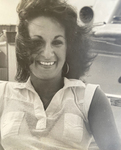
Lou got involved with CancerCare when he lost his wife Yolanda to glioblastoma after being with her for over 40 years. His son suggested CancerCare and he joined a bereavement support group. “It was the best thing that ever happened to me because when you’re surrounded by people who have experienced what you’ve experienced, you feel comforted, you feel you’re not so alone.”
In bereavement group, Lou found connection and community. “This first group that I was in was such a warm, special group,” he said. “I have friends that I know I’ll be friends with forever. It was just chemistry.”
People who lose a spouse can feel like their whole life has changed. “We did everything together. There was nothing we would do without each other. There was nothing that we didn’t lean on each other for and now she’s gone. I have to start a whole new life at this point in my life and I don’t know how to do it.”
Receiving misguided advice from others who don’t understand is another common challenge for those who have lost a spouse. “Everyone says you have to move forward. You have to keep yourself busy. Tell me how to do that.” Lou finds that simply being there for him is more helpful. “I don’t need people telling me what to do constantly. I need people to lean on me and say, when you need, I’m here for you.”
Lou has found ways to cope with his grief and stay connected to his wife’s memory. He remembers that he went to church with her and she learned how to make Jewish dishes for him. Now, he finds support from people involved in the church and comfort from participating in Yolanda’s faith. “This Jewish kid probably will end up getting baptized because if that’s part of what I need to get to be with my wife, I’ll do it.”
He finds other ways to connect to his wife’s memory through her things, their house and continuing to wear his wedding ring. “As people show me kindness, I give them something of hers that I knew she loved or she enjoyed because they showed me kindness in my life,” Lou shared. “Giving it to them, I know she would like that.”
Acknowledging the small steps towards healing was important during Lou’s experience with grief. “I realize that every little thing you do is a step forward. No great revelation is going to happen in your life that you’re going to realize you’ve passed it and you can move on in your life. They’re little pieces, one by one. Sometimes it takes longer, sometimes it doesn’t take that long. But you move forward, taking little steps. There are no big steps in this process.”
For others coping with loss, Lou emphasizes that there is no right or wrong way to grieve. “Don’t ever apologize for crying and don’t ever decide what you’re doing is wrong because whatever you have to do to get through the day is right for you.”
He also suggests connecting with other people who have similar experiences. “Try and surround yourself with people who’ve experienced it because they’re the true ones that can understand. If you’re lucky enough to build a bond or relationship with these people, it’ll be something that will benefit you for life.”
